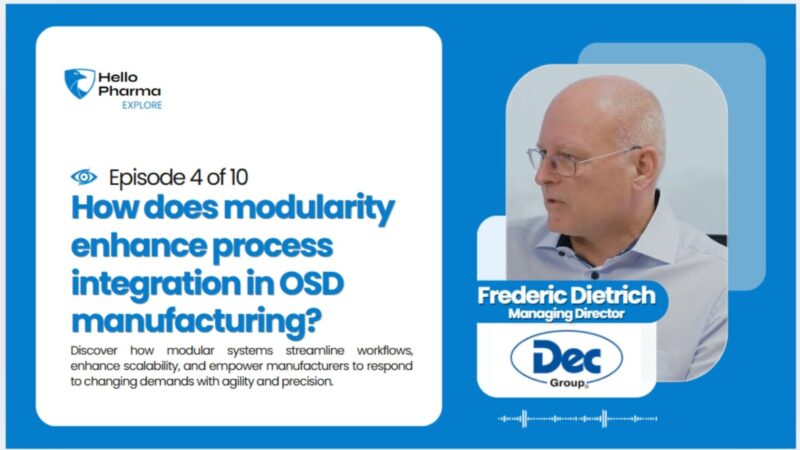In oral solid dosage (OSD) manufacturing, modularity has emerged as a powerful design principle that enables greater flexibility, scalability, and efficiency in production. In Episode 4, we explore how modular approaches are transforming OSD processes and how they align with the demands of modern pharmaceutical manufacturing.
Mr Frederic Dietrich, Managing Director of Dec Group, joins us to discuss how modular systems provide a structured yet adaptable framework for integrating key unit operations. Unlike traditional production lines that are often built as monolithic systems, modular designs break processes down into discrete, functional units. Each module is optimized for a specific task—such as blending, granulation, drying, or tableting—and can be configured or scaled independently to match changing production needs.
The discussion begins by examining the challenges faced by manufacturers in OSD production. With growing pressure to accelerate time-to-market and manage increasingly complex formulations, companies must balance the need for flexibility with the need for robust, repeatable processes. Modular systems help address these challenges by enabling rapid reconfiguration and easier upgrades as product portfolios evolve.
Mr Dietrich highlights how modularity simplifies integration and validation. Pre-engineered modules can be assembled in a plug-and-play fashion, reducing engineering time and minimizing disruptions during facility upgrades or expansions. This approach also supports compliance with regulatory frameworks, as standardized modules are easier to qualify and validate within GMP environments.
Beyond flexibility, modular designs also support enhanced process control and data integration. Each module can be equipped with dedicated sensors and control systems, feeding data into a centralized platform that enables real-time monitoring and adjustment. This level of control is critical in OSD manufacturing, where maintaining precise conditions is essential for product quality and consistency.
Containment is another key consideration in modular process integration, especially when handling high-potency or sensitive materials. Mr Dietrich explains how modular containment solutions can be seamlessly integrated with core process modules, ensuring operator safety and product integrity without compromising modular flexibility.
The episode also explores how modularity aligns with broader trends in pharmaceutical manufacturing, including continuous processing and digital transformation. Modular systems are well-suited to continuous manufacturing environments, allowing manufacturers to start small, test, and expand capacity incrementally as demand grows. They also enable a phased approach to facility upgrades, making it easier to adopt new technologies without full-scale facility redesigns.
Looking to the future, modularity promises to remain a cornerstone of modern OSD manufacturing strategies. As product pipelines diversify and demand for high-potency therapies grows, modular systems offer manufacturers a path to more agile, efficient, and compliant production.
Join us in this episode as we examine the role of modularity in driving process efficiency and integration in OSD manufacturing, setting the stage for deeper dives into specialized technologies and best practices in upcoming discussions.
For more insights and detailed content on pharmaceutical technologies and processing, visit www.hello-pharma.com.






